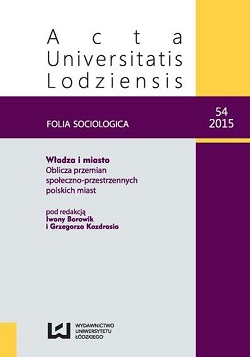Urban studies – old and new questions
DOI:
https://doi.org/10.18778/0208-600X.54.02Keywords:
urban, creative class, creative citiesAbstract
This article presents, from sociological perspective, some selected methodological issues related to urban studies. The authors of such studies remain between creating theory of the city functioning, and depicting a changing urban reality, thus investigating the history of a city. In the first strand we will encounter the more or less formalized works, such as these of Louis Wirth or Richard Florida, or the quantitative concept of Geoffrey West and Louis Bettencourt. The second type of studies is represented by Max Weber, Fernand Braudel and others. The author, although not denying the merits of the first strand, claims that so far the descriptive-historical approach is more useful in explaining the process of urban development.
References
Braudel F. (1992), Kultura materialna, gospodarka i kapitalizm XV−XVIII wiek. Struktury codzienności, PIW, Warszawa.
Google Scholar
Darchen S., Tremblay D.-G. (2010), La thèse de la classe créative. Revue des écrits et perspectives des recherche, [w:] Tremblay R., Tremblay D.-G., La classe creative selon Richard Florida. Un paradigme urbain plausible, Presse de l’Université du Québec, Presses Universitaires de Rennes.
Google Scholar
Dogan M., Pahre R. (1991), L’innovation dans les sciences sociales. La marginalité créatrice, PUF, Paris.
Google Scholar
DOI: https://doi.org/10.3917/puf.dogan.1991.01
Florida R. (2004), The Rise of Creative Class, Perseus Books, New York.
Google Scholar
Florida R. (2005), Cities and the Creative Class, Routledge, New York − London.
Google Scholar
DOI: https://doi.org/10.4324/9780203997673
Florida R. (2008), Who’s Your City?, Perseus Books, New York.
Google Scholar
Guillaud H. (2011), Comprendre les lois de la ville, portal: InternetActu.net, http//www.internetactu.net/2011/01/06/comprendre-les-lois-de-la-ville/.
Google Scholar
Shearmur R. (2010), L’aristocratie mobile du savoir et son tapis rouge. Quelques réflexions sur les thèses de Richard Florida, [w:] Tremblay R., Tremblay D.-G., La classe creative selon Richard Florida. Un paradigme urbain plausible, Presse de l’Université du Québec, Presses Universitaires de Rennes.
Google Scholar
DOI: https://doi.org/10.2307/j.ctv18phg6g.7
Tremblay R., Tremblay D.-G. (2010), Richard Florida. L’Homme et sa classe, [w:] Tremblay R., Tremblay D.-G., La classe creative selon Richard Florida. Un paradigme urbain plausible, Presse de l’Université du Québec, Presses Universitaires de Rennes.
Google Scholar
DOI: https://doi.org/10.2307/j.ctv18phg6g
Vivant E. (2010), Vers un urbanisme creative, [w:] Tremblay R., Tremblay D.-G., La classe creative selon Richard Florida. Un paradigme urbain plausible, Presse de l’Université du Québec, Presses Universitaires de Rennes.
Google Scholar
DOI: https://doi.org/10.2307/j.ctv18phg6g.9
Weber M. (2002), Gospodarka i społeczeństwo, PWN, Warszawa.
Google Scholar
Wirth L. (1938), Urbanism as a Way of Life, “American Journal of Sociology”, no LXIV.
Google Scholar
DOI: https://doi.org/10.1086/217913
Downloads
Published
How to Cite
Issue
Section
License
Copyright (c) 2015 © Copyright by Bohdan Jałowiecki, Łódź 2015; © Copyright for this edition by Uniwersytet Łódzki, Łódź 2015

This work is licensed under a Creative Commons Attribution-NonCommercial-NoDerivatives 4.0 International License.










